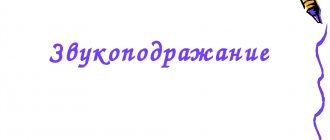The fact that the language's dictionary contains approximately 300 thousand words is only of theoretical interest for a beginner learning this language. Perhaps the main principle for the reasonable organization of your studies, especially at the initial stage, is the economy of words. You need to learn to memorize as few words as possible, but do it as best as possible.
Let us emphasize that our approach is directly opposite to the guiding principle of “suggestopedia”, with its emphasis on the abundance of words presented to the student. As you know, in accordance with its canons, a beginner needs to be literally “showered with words.” It is best to give him or her 200 new words every day.
Is there any doubt that any normal person will forget all those numerous words with which he was “showered” using this, so to speak, method - and most likely very soon, in just a few days.
Don't chase too much
It will be much better if at the end of a certain stage of study you know 500 or 1000 words very well than 3000 - but poorly. Don’t let yourself be led into a dead end by teachers who will assure you that you need to first learn a certain number of words in order to “get into the swing of things.” Only you yourself can and must decide whether the vocabulary you have mastered is sufficient for your goals and interests.
Language learning experience shows that about 400 well-chosen words can cover up to 90 percent of the vocabulary you need for everyday communication purposes. In order to read, you will need more words, but many of them are only passive. Therefore, with knowledge of 1500 words, you can already understand fairly meaningful texts.
It is better to master the words that are most necessary and important to you than to constantly rush to learn new ones. “He who pursues too much risks missing everything,” says a Swedish proverb. “If you chase two hares, you won’t catch either,” says a Russian proverb.
Techniques for expanding your vocabulary without extra time
Developing vocabulary is essentially necessary for voicing your thoughts, intentions, analysis and conclusions. This skill is strengthened by practice and weakened by its absence. Therefore, in order to develop your speech, you should constantly communicate. The growth of vocabulary is ensured: by learning new words that we hear from our interlocutors; precise definitions when words are translated from a passive vocabulary to an active one.
- Therefore, it is advisable to communicate with unlike people. These are friends, neighbors, fellow students, comrades in the gym. People meeting on the Internet on forums and social networking pages, fellow travelers and sellers also serve as an opportunity for communication and as a way to expand your speech.
- Another effective way to replenish your vocabulary, which does not require special time, is listening to audio books. This is relevant when you have to spend a lot of time on the road, driving your car, ideal for auditory learners (for people who better perceive information by ear). A variety of books are sold in this format: novels, aphorisms, and philosophical teachings. By recording it on a flash drive, you can now not get bored in a traffic jam, but listen to a fascinating story. It is convenient to listen to audio books before bed.
Vocabulary in oral speech
Very roughly speaking, about 40 well-chosen, high-frequency words will cover about 50% of word usage in everyday speech in any language;
- 200 words will cover about 80%;
- 300 words - approximately 85%;
- 400 words will cover about 90%;
- Well, 800-1000 words are about 95% of what would need to be said or heard in the most ordinary situation.
Thus, the right vocabulary helps you understand quite a lot with very little effort spent on cramming.
Example: if a total of 1000 words are spoken in an everyday conversation, then 500 of them, that is, 50%, will be covered by the 40 most common high-frequency words.
We emphasize that these percentages, of course, are not the result of exact calculations. They simply give the most general idea of how many words it will take to feel confident when entering into a simple dialogue with a native speaker. In any case, there is no doubt that by correctly choosing from 400 to 800 words and remembering them well, you can feel confident in a simple conversation, since they will cover almost 100% of those words that you cannot do without. Of course, under other, less favorable conditions, 400 words will cover only 80% of what you need to know - instead of 90 or 100%.
What is a lexicon?
From ancient Greek it means “word”, “figure of speech”. The exact lexicon sounds like this: a combination of words of a particular language, parts of words or language that a specific person or a specific group of people speaks. Vocabulary is the central part of the language, which names, forms and conveys knowledge about any phenomena or objects. In other words, this is a language section that studies words, pronunciation, composition of speech, etc.
Reading vocabulary
When reading, having correctly chosen and well remembered about 80 of the most common, most frequent words, you will understand about 50% of a simple text;
- 200 words will cover approximately 60%;
- 300 words - 65%;
- 400 words – 70%;
- 800 words - approximately 80%;
- 1500 - 2000 words - about 90%;
- 3000 — 4000 — 95%;
- and 8,000 words will cover almost 99 percent of the written text.
Example: if you have a text in front of you with a volume of approximately 10 thousand words (this is approximately 40 printed pages), then, having learned the most necessary 400 words in advance, you will understand about 7000 words that are used in this text.
Let us note again that the figures we give are only indicative. Depending on various additional conditions, 50 words will cover up to 50 percent of the written text, but in other cases you will need to learn at least 150 words to get the same result.
Notes[ | ]
- V. Pekelis “Cybernetic mixture”, M., “Znanie”, 1991, pp. 323-324; IEEE Proc., 1985, Vol.68, No.7
- Vocabulary of Russian speakers: influence of age and education
- Merriam-Webster.
How many words are there in English?
(undefined)
(1993). - Nihon kokugo daijiten. — Dai 2-han. — Tōkyō: Shōgakkan, 2000-2002. — 13 volumes p. — ISBN 4-09-521001-X, 978-4-09-521001-8.
- 別表学年別漢字配当表:文部科学省(undefined)
. www.mext.go.jp. Date accessed: February 6, 2021.
Vocabulary: from 400 to 100,000 words
- 400 - 500 words - active vocabulary for language proficiency at a basic (threshold) level.
- 800 - 1000 words - active vocabulary in order to explain yourself; or passive reading vocabulary at a basic level.
- 1500 - 2000 words - active vocabulary, which is quite enough to ensure everyday communication throughout the day; or passive vocabulary sufficient for confident reading.
- 3000 - 4000 words - in general, enough for almost fluent reading of newspapers or literature in the specialty.
- About 8,000 words - provides full communication for the average European. There is practically no need to know more words in order to communicate freely both orally and in writing, as well as read literature of any kind.
- 10,000-20,000 words is the active vocabulary of an educated European (in their native language).
- 50,000-100,000 words - the passive vocabulary of an educated European (in their native language).
It should be noted that vocabulary alone does not ensure free communication. At the same time, having mastered 1,500 correctly chosen words, with some additional training, you will be able to communicate almost freely.
As for professional terms, they usually do not present any particular difficulties, since in most cases this is an international vocabulary that is quite easy to master.
When you already know about 1500 words, you can start reading at a fairly decent level. With passive knowledge of 3,000 to 4,000 words, you will be fluent in reading literature in your specialty, at least in those areas where you are confident. In conclusion, we note that, according to calculations carried out by linguists based on a number of languages, the average educated European actively uses about 20,000 words (and half of them are quite rare). In this case, the passive vocabulary is at least 50,000 words. But all this concerns the native language.
Number of words in the lexicon
It should be noted, returning to the question of what a lexicon is, that each person’s active and passive dictionaries are individual. It depends on the age, profession, general cultural level, personal qualities, tastes and even the place of residence of the person. According to statistics, the active vocabulary of an adult with higher education is seven to nine thousand words. Passive - twenty to twenty-four thousand. Although in everyday communication we get by with only one or two thousand words. They say that the possibilities of human memory are almost limitless. Therefore, you can safely increase your vocabulary and learn foreign words, thereby enriching the Russian vocabulary.
It is believed that at the dawn of human existence, speech was not much richer than that of some animals. If, for example, a chicken’s “language” has 10 simple signals, a baboon’s “language” has 18, then a primitive man, like a chimpanzee, had a “vocabulary” that barely exceeded 30 signals—cries.
As society developed, human speech was constantly enriched with new words. The Dictionary of the Modern Russian Language, published in 1956-1965 by the Academy of Sciences, contains 120,480 words in 17 volumes.
How quickly do children learn speech? If a child at the age of one year knows only three words, then six months later his vocabulary increases to 26-28 words. At four years old he already knows about 1000 words, and at six and a half years old he pronounces an average of 2 thousand words and understands the meaning of another 6 thousand.
Scientists have conducted research and calculated that in the works of the ancient Roman poet Horace there are 6084 different words; the English poet Milton has approximately 8 thousand words; in Homer's poems - about 9 thousand words; in the works of Shakespeare - 15 thousand words (according to other sources - up to 24 thousand words), in the works of Pushkin - 21 thousand words.
It is interesting to compare the number of words used by ordinary people with the dictionaries of great writers. According to psychologists, a 14-year-old teenager uses 9 thousand words, the average adult uses 11,700 words, and an educated person uses up to 13,500 words.
I wonder how many words a person says every day? It depends on temperament, profession and other conditions. Scientists still established an average figure: 30 thousand words. At the same time, a person speaks on average at a speed of 125-160 words per minute, and thinks in the same words twice as fast.
According to research, the recognized “talkers” are the French. Their average speech speed is 350 syllables per minute. The Japanese are behind them - 310 syllables and the Germans are not far behind - 250 syllables. Polynesia and Melanesia - an average of 50 syllables per minute.
The Finns are the most silent nation in the world. Canadians follow. The most talkative and loud are the Italians, Brazilians and Mexicans.
Is it useful to talk? Useful - this is what American Professor Williams says. People who don’t talk much are susceptible to various kinds of stress, as they do not give an outlet to the energy that has accumulated in them. As a result, they age prematurely.
And one more interesting data. Experts have calculated that each person speaks on average one hour a day. Over the course of a lifetime, this is approximately 2.5 years. If everything said by a person during his life is recorded on paper, the result will be a thousand volumes of 400 pages each.
For a long time, many people have thought that women speak more than men. But recently, scientists have tested and refuted this opinion, finding that, in general, both men and women pronounce the same number of words, which means they are equally talkative.
The Russian language is distinguished by its richness of vocabulary. Dahl's dictionary contains about two hundred thousand lexical units. Much fewer words are used in everyday life.
About Pareto's law and the importance of linguistic guesswork
You may have heard of Pareto's law, also known as the 80/20 principle. The Italian engineer and philosopher Vilfredo Pareto studied numerous phenomena and objects, from land ownership to pea pods, and as a result came up with a rule that was called Pareto's law: 20% of the causes give 80% of the effects. Or, if you apply the law to study or work: 20% of the effort gives 80% of the result.
English language learners need to understand 90-95% of the words most commonly used in everyday life. Where exactly do these numbers come from? This is approximately how many words you need to know in order to clearly understand what is written and said. In addition, having learned just that many words, you will be able to guess the meaning of the remaining 5-10% simply from the context! Not quite 80/20, but the principle is the same: only a small part of your efforts will bring a significant result.
This is an extremely important point! If you have already reached a high level of understanding of the language, it is time to close the dictionary and allow yourself to learn “inductively”, from context and by guessing. You already do this every day - no one knows all the words in their native language. So why not do the same with English?
Weigh your vocabulary!
So, if you achieve an understanding of 95% of the most frequently used words in a language, you can understand the rest of the unfamiliar words from the context.
Of course, knowing words does not mean perfectly understanding what you listen to or read, because language is also grammar, phraseological units and figures of speech that can (and will!) get in your way. A sentence can consist entirely of words that are perfectly familiar to you and at the same time be completely incomprehensible - precisely because of such linguistic phenomena.
Despite this, in most cases, knowing 90-95% of the words in a sentence and the context allows you to understand and communicate in a language without much difficulty - especially if it belongs to the same language family as your native language.
Yes, the English language has a huge number of words, so many people see it as an impregnable fortress that will take decades to conquer. In reality, if you learn words in context from the very beginning, step by step building up your vocabulary “arsenal” to 2500-3000 units, it is possible to quickly reach a level at which you can read texts on general topics and understand 90-95% of what is said .
This is the ideal number; this is exactly how many words you need to learn for the experience of reading foreign language texts to be successful. This is also the approximate number of words that you need to know in order to understand the meaning of the remaining words from the context.










